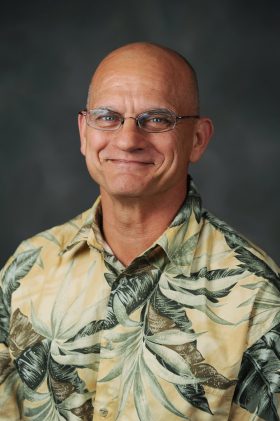Professor Tom Arcaro writes in a newspaper guest column about a new model for delivering humanitarian aid around the globe, and he calls on colleges and universities to be a part of finding solutions to challenging social ills.
The following column appeared recently in the Roanoke (Va.) Times and the (Burlington, N.C.) Times-News via the Elon University Writers Syndicate. Viewpoints shared by this syndicate are those of the author and not of Elon University.

By Tom Arcaro – arcaro@elon.edu
In San Pedro Sula, the “murder capital of the world,” the most violent city in the violent nation of Honduras, a progressive approach to humanitarian work is taking shape following years of extreme bloodshed and poverty. It’s a model we all should watch closely – especially those of us who work or teach in higher education.
It certainly wasn’t safe there for me to walk outside the small hotel where I stayed this summer, and the driver that provided my transportation was armed. Three middle school girls had recently been kidnapped outside the main gate of their school and local gangs had established a neighborhood curfew.
Never mind its political corruption, poor health services, woefully inadequate educational system and dim economic prospects. When you walk the streets of a city in fear for your life, how can you convince global nonprofit organizations to focus volunteer time and energy in helping you craft solutions?
A critical dimension of this partnering process is to ensure the safety of all involved, including both locals and humanitarian aid workers. Without the guarantee of at least modest security measures, humanitarian efforts can fail. Just this summer, the Nobel Prize-winning international medical charity Doctors Without Borders, known also as MSF, announced its departure from Somalia because of violence against its volunteers, and in 2012 the Peace Corps pulled out all of its volunteers after more than five decades of service.
Nor should we rely exclusively on our governments to solve these vexing problems. Recent failed attempts to facilitate democracies both in Iraq and Afghanistan bring into question the efficacy of state-led humanitarian actions.
Yet I refuse to accept the idea that successful, global humanitarian efforts are, as some respected international writers have said, “a dream that has run its course.” Which brings me back to San Pedro Sula. As an administrator of a program hoping to partner in Honduras it raised my spirits to learn how some of the more visionary corporations and foundations there have banded together and are moving forward with a long-term “What Can You Do for Honduras?” campaign.
And in many conversations, it was shared with me that one thing Honduras seeks is the social capital that institutions of higher learning possess, the leadership and enthusiasm and hope that are abundant in our world’s younger generations. Opportunities abound to create lasting relationships between college students and citizens elsewhere on our planet working to improve the lives of all people.
Leaders at American colleges and universities only need to give their students and professors the space and encouragement to reach across organizational boundaries to carve together with their counterparts a common path toward a healthier future. By doing so, in addition to supplying the next generation of engineers, doctors and teachers, the American system of higher education will create more pathways for students to become the visionaries who drive back the forces of corruption, violence and cultural entropy.
It is time for colleges and universities to take part in building these necessary bridges between the academy, global businesses and humanitarian aid organizations.
Some corners of private industry are demonstrating how a model might work. In Honduras, Cargill International is giving key employees the time for them to take leadership in the “What Can You Do for Honduras?” campaign. What we’re seeing is a cultural shift that involves closer cooperation and coordination among corporations, governmental and non-governmental organizations, educational institutions, social and philanthropic leaders, and the average Honduran who just wants to live productively and safely in the arms of her family.
Nations are woven together economically, environmentally, politically and even spiritually. What happens on Main Street in San Pedro Sula, Mogadishu, Damascus, or Kabul impacts the people and institutions on Main Street in America no matter how much some people try to deny it. When you ignore the woes of other people, you do so at your peril, as terrorism, drugs and crime have the immortal tendency to creep across the arbitrary lines of a map.
We should watch the progress of the “What Can You Do for Honduras?” campaign and cheer them along as they protect the small flame of hope that they want to build into a raging, celebratory bonfire. If this effort has measurable success, perhaps their model of action can be replicated elsewhere.
One thing is certain: Our cultural narratives are now intertwined, and we will create the next human chapter together. Let’s make it one with a positive theme.
Tom Arcaro is a professor of sociology at Elon University.
*****
Elon University faculty with an interest in sharing their expertise with wider audiences are encouraged to contact Eric Townsend (etownsend4@elon.edu) in the Office of University Communications should they like assistance with prospective newspaper op/ed submissions.


